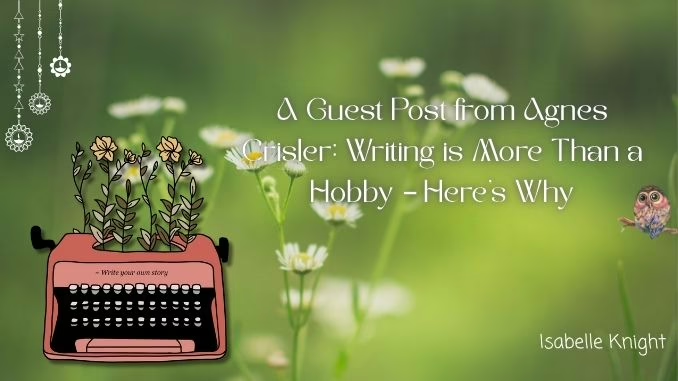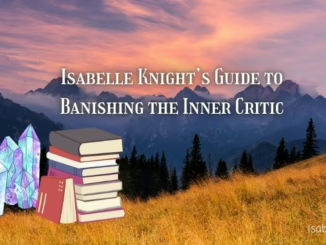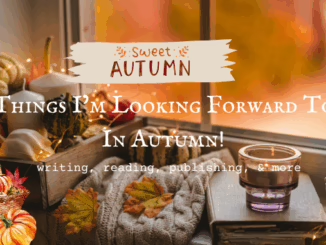
Hey, guys! This post is actually kind of different from my usual posts, and that is because instead of a writing update or book review, today I’m actually sharing a guest post with you from a friend of mine and a very talented writer, Agnes Crisler! We have interviewed each other before on my YouTube channel, and her two short, Christmas romance stories are published in the Christmas Stories anthology, and her new MG fantasy short story is soon-to-be published in the Realms and Beyond fantasy anthology (which should be published sometime in August!)
Agnes is incredibly talented at writing, and I believe she’s currently working on a YA summer romance (haven’t read it, but I have heard snippets of it, and I’m sure it’ll be incredible), and so I am super excited to be sharing this guest post with you, where Agnes talks about why writing is so much more than a hobby and how to help and compromise with the young writers in your life!
Take it away, Agnes!
Writing is More Than a Hobby — Here’s Why
Originally posted at journeybloomfield.wordpress.com (thank you to Journey and Agnes who didn’t mind me also sharing Agnes’s post as a guest post!!!)
Personal Introduction From The Author
I’m Agnes Crisler, a teen author who’s striving to grow as a writer. Writing isn’t just a hobby like most people who don’t read or write might think. Writing is a big part of the modern world and shouldn’t be ignored or disowned–especially for teen writers who are looking for support.
My achievements vary from published stories in anthologies to author interviews to being active in the writing community.
My goals aren’t small either—especially when they are things like finishing my debut novel (Notes Between Us), publishing, marketing, connecting with more authors, and finding legit work opportunities that will help launch my writing career.
Mental Health Benefits
Writing might just seem like sitting down, typing, then closing your computer and calling it “writing” —and sure, that’s partially true, but there’s more to it than most think.
Writing helps with emotional expression, stress relief, and increasing focus. Those sound like something that shouldn’t be ignored by modern society. And guess what? There’s more to the picture. It helps develop key life skills such as creativity, discipline, and communication. In society, those are important to achieve success in life and in your craft.
The Problem With Limits
Too short of writing time during the week is going to affect growth as a writer. Sometimes, when you have a fun scheduled activity it ends up turning it into another task on the calendar. When you shorten or box in writing time it threatens to ruin a writer’s skill to grow and improve in their craft.
Creativity can’t always fit into a strict schedule and let’s be honest, limited time can cause stress, hurt motivation, and make a writer feel like they aren’t getting anywhere.
Imagine you have to drive to an appointment or something important, and you’re only given a small portion of gas at a time. It would take a long time to get there, wouldn’t it? Now imagine you’re a young writer, who has a goal to publish and expand your craft, but your time writing is limited and you’re going to take even longer to get there on top of the long writing process in general.
Let’s look at it through a different lense—you can’t take a painter’s tools away, give them a short amount of time to paint during the week, and give them crayons and a piece of paper and expect them to be successful as an artist.
Think about famous painters and authors such as Jane Austen or Picassso—they had time to explore and expand their work and now, their creativity teaches generations that working hard and being creative can lead to good things.
Proposed Compromise
Try giving that young writer in your life (or supporting young writers in the community) a chance to commit to writing for focused hours during the week, Monday through Friday. Outside of that time, they can actively engage in family life—completing chores, participating in physical activity, and offering help where needed. For example: a teen wants to write and you don’t mind them being creative but there are tasks around the house that you need help with. Make a compromise with them so that by helping you with tasks you can help them with theirs.
To maintain transparency and build trust, the writer could regularly check in with a parent or guardian, updating them on goals and progress so the schedule feels collaborative and respectful. Keep in mind that it’s important to give them an opportunity to self-manage and show responsibility—you may be surprised by the results.
Final Note
Help that young writer in your life complete their goals and achieve their writing dreams. Give them a chance to show you that writing is a part of growth and not something to control. And lastly, have open conversations about creative life together—this will openly show your support for their writing.
So remember, giving a young writer the opportunity to grow in their craft is far more important than one might think. And lastly, this is the next generation–let’s build it up, not tear down.
~ ~ ~
A huge thank you to Agnes Crisler for writing this marvelous guest post and for letting me post it! She is a fantastic writer, and I cannot wait to see where her writing takes her next! Thank you so much for reading, and don’t forget to check out her two wonderfully written stories in the Christmas Stories anthology!
ABOUT THE AUTHOR:
Agnes Crisler is a high school student and indie author with a passion for storytelling. When she’s not crafting new worlds on the page, she’s lost in a great book, practicing archery, or horseback riding through the countryside. She thrives on adventure, both in life and in fiction, and loves creating stories that spark emotion and imagination.





Be the first to comment